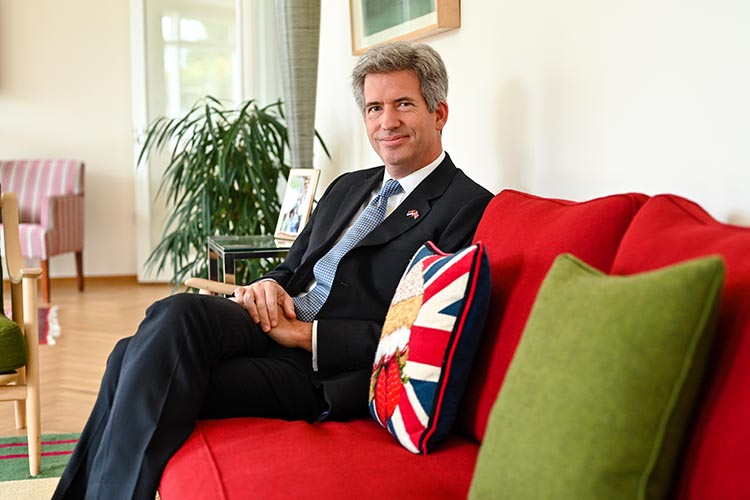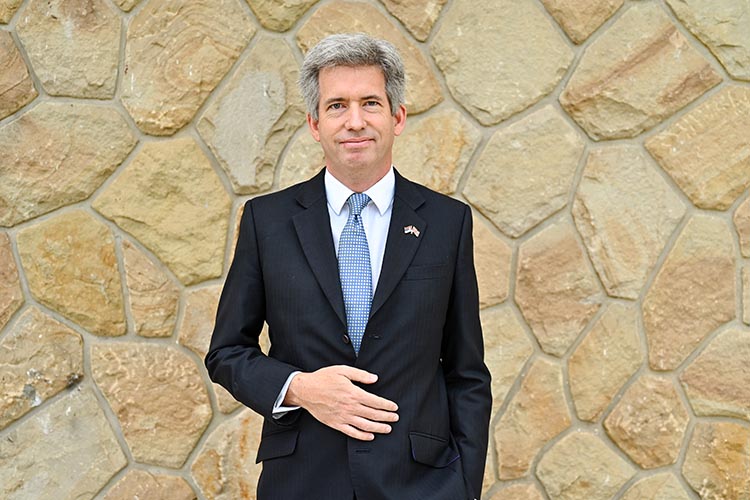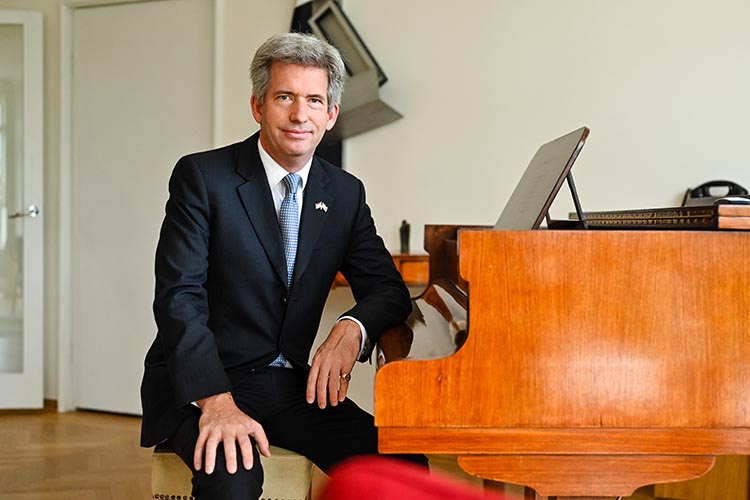The position of the British Government aligns with that of KFOR, which has confirmed that they have no evidence that the Serbian Orthodox Church is involved in weapons smuggling from Serbia to Kosovo. However, as we saw in Banjska, it is very clear that there is a real problem with the availability of illegal weapons in northern Kosovo.This has already caused the deaths of too many people.It is vital that everyone works together to create a safer and more secure environment for the benefit of all citizens and communities in Kosovo ~ Edward Ferguson
The UK wants to be part of a positive story that leads this region to strengthening peace and prosperity and economic development, says new ambassador Edward Ferguson. Speaking in this interview for CorD Magazine, he adds that he has come to Belgrade with “£4bn of funding available for Serbia” and that he sees “clear opportunities for UK finance to support large infrastructure and renewable energy projects, including road and rail improvements, as well as solar, hydro and wind energy production”. At the same time, he admits that he’s aware that relations between the UK and Serbia have had their ups and downs, and he notes that during his first weeks in the country he was often asked about allegations of weapons being hidden in the churches and monasteries of the Serbian Orthodox Church in Kosovo.
Your Excellency, you stated upon arrival in Belgrade that you would like to revitalise the traditionally good relations between the UK and Serbia, with a view to the alliance of the two world wars, mutual national respect and shared interests. What would you single out as the current common interests of the UK and Serbia?
You are absolutely right that the UK and Serbia share a long and dramatic history of close relations. During my first months here, I have been fascinated to learn more about the stories that have connected us for nearly two centuries; about Dositej Obradović, Serbia’s first Minister of Education and a fervent anglophile who used to live in London; about the hundreds of Scot tish doctors and nurses who cared for Serbian soldiers and civilians during the typhus epidemic of World War I, and about the vital role of the British military missions in helping to defeat the Nazis in Yugoslavia in World War II.

I’ve learned about the strong connections between our churches – from Scottish missionary Francis Mackenzie, who donated the land for the Temple of Saint Sava in Belgrade, to eminent Orthodox theologians like Saints Nikolaj Velimirović and Justin Popović, who found wartime refuge in Britain. I’ve learned about our strong cultural relations – from the Henry Moore exhibition in 1955, which kickstarted the abstract art movement in Yugoslavia, through great British comedies, such as Only Fools and Horses and Monty Python, that have made us laugh together, to today’s vibrant exchanges in music, film and sport.
So, we have a rich, shared history. During those two centuries, there have certainly been ups and downs – but my first weeks in Serbia have made me optimistic and ambitious for the future. First and foremost, of course, we share an interest in peace and prosperity on the European continent. Serbia’s economy is doing well: you have doubled your GDP in a decade, and have succeeded in attracting record foreign investment. There are important projects underway to improve infrastructure and boost renewable energy. Serbia will be in the global spotlight when it hosts Expo 2027, but Serbia, like every other country in Europe, is feeling the effects of Russia’s devastating, illegal invasion of Ukraine in the form of high inflation, from rental prices to the cost of energy and food. And the persistent sense of instability across the Western Balkans continues to hold Serbia and its neighbours back from achieving their true economic potential. We may not always agree on how best to solve these problems, but we certainly share an interest in finding solutions that can help to build a positive narrative about the future of this region. The UK wants to be part of that positive story and I personally want to build a bilateral partnership between the UK and Serbia that is modern, dynamic and firmly oriented towards the future.
You’ve also said that you would like to see many more British companies coming to invest in and trade with Serbia, because our country has “wonderful economic possibilities”. In which areas do you see room to advance bilateral economic cooperation?
I see a lot of opportunities and I am very ambitious to grow our trade exchange. We already have some big investors here, including Astra Zeneca, which has recently signed an MoU with the Government to collaborate on the BIO4 campus, as well as Jaguar Land Rover, G4S and Hive Energy, a major investor in solar power generation. A British company called Menzies Aviation has just agreed a joint venture with Air Serbia to provide ground services at Belgrade airport. The volume of trade in goods between the UK and Serbia recently broke through the £1bn barrier. So, we have a strong foundation, but there is a lot of room for growth.
I find it very encouraging that both President Vučić and PM Kurti, as well as the Serb communities in northern Kosovo, can all agree that KFOR, as a NATO force, is responsible and impartial
One of our most important tools is our ability to offer competitive, flexible UK Export Finance, which we are already using to enable large-scale projects like the Morava highway. We have up to £4bn of funding available for Serbia. The beauty of the funding is that it is sovereign-backed, which means that Serbia can borrow against the UK’s credit rating rather than its own, which keeps interest rates low. I see opportunities for UK finance to support large infrastructure and renewable energy projects in Serbia, including road and rail improvements, as well as solar, hydro and wind energy production.
In discussions with your interlocutors in Belgrade, you’ve expressed an interest in cooperation in the field of environmental protection. Do you have understanding for the stance of Serbian citizens who believe that the mining of lithium – which is also of interest to British-owned companies – will have a disastrous environmental impact in Serbia?
I have only been here for three months, but I have already been lucky enough to spend quite a lot of time travelling around Serbia. It really is the most beautiful country. You have an incredible richness and diversity of natural beauty, but I think everyone would agree that there is a lot to be done to protect and improve the natural environment – from reducing air pollution in cities to raising water quality in your rivers. So, yes, of course I understand why people feel passionately about protecting their environment, and I think that British companies have a great deal of expertise, for example in waste management, water treatment and green energy, which could help. In all that we do, we must keep in mind what we will pass on to future generations.

However, I have to say that there is a lot of misunderstanding about what lithium exploitation in Serbia might actually involve. UK-owned mining companies like Rio Tinto are amongst the most capable and environmentally responsible in the world. No-one can deny that mining of any kind has an environmental impact, but there are ways to keep that impact to an absolute minimum. I think it’s really important to have more dialogue between companies, government, local communities and environmental groups. I’d hope that it should be possible to negotiate a way forward where everyone can win.
Ultimately, it’s up to the Serbian Government to decide whether to proceed with lithium mining, and to put in place strong safeguards to protect the natural environment. At the same time, I think it’s also really important to recognise that Serbia’s huge lithium reserves represent a strategic opportunity for this country: to give a huge boost to the economy, both at the local and national level, and to put Serbia right at the heart of Europe’s green transition. But this opportunity is time-limited. New lithium mines are coming online all over the world, and Serbia needs to move quickly if it to secure the maximum benefit.
If lithium is so important and profitable, why is it not yet being mined in the UK, which possesses rich reserves and certainly has more significant mining experience than many European countries, including Serbia?
Actually, we are right now in the process of opening up the UK’s first lithium mine in Cornwall. The British Government is investing in the mine through the UK Infrastructure Bank, precisely because we recognise lithium’s importance as a driver of economic growth and energy security, and because lithium is critical to the future of electric vehicle battery consumption and to the decarbonisation of the transport sector.
You have an incredible richness and diversity of natural beauty, but I think everyone would agree that there is a lot to be done to protect and improve the natural environment – from reducing air pollution in cities to raising water quality in your riversl
You can rest assured that we will only be proceeding with lithium mining in the UK because we are satisfied that it is indeed possible to apply high environmental standards. So, to be clear, we’re not in any way seeking to offshore lithium production to Serbia in order to spare ourselves the environmental harm. On the contrary, we see an opportunity for Serbia to become a major player in the global lithium market, in a way that could turbo-charge your commercial relationships with countries like the UK – and we’re keen to support and enable that opportunity, should you choose to proceed.
It was announced following the latest security incident in Kosovo that the UK will be sending another 200 troops to strengthen KFOR forces. In your opinion, what role does KFOR play in Kosovo today: to ensure the implementing of UNSC Resolution 1244 or to assist the Pristina government in establishing full control over the territory that it declared as being independent of Serbia?
The role of KFOR is very clearly defined. It is to ensure a safe and secure environment and freedom of movement for all people and communities in Kosovo, and that is what the UK troops assigned to KFOR will be doing. There are actually 600 additional UK troops assigned to KFOR: 400 were already in Kosovo on an annual training exercise, and 200 have subsequently arrived from the UK.
I know the relationship between Serbia and NATO can be a complex one, but I find it very encouraging that both President Vučić and PM Kurti, as well as the Serb communities in northern Kosovo, can all agree that KFOR, as a NATO force, is responsible and impartial; that it is a force for good that contributes to security in Kosovo and the wider region. What is most important now is to calm the situation on the ground. Emotions have been running high on all sides, but governments and the media in Serbia and Kosovo need to stop their inflammatory rhetoric, which risks further aggravating tensions. It has been encouraging to see Serbian armed forces pulling back from the border, and the arrest of Milan Radoičić, the confessed leader of the armed group that killed the Kosovan policeman. Serbia now needs to show that those responsible for this unacceptable attack will face justice, and we need to see urgent steps to address the uncontrolled proliferation of weapons in northern Kosovo.
Do you believe it is possible to resume the dialogue between Belgrade and Pristina, and, if so, what would you consider as being urgent issues that should be on the agenda of these discussions?
It may not be easy, but it is both essential and urgent. Recent events show very clearly what is at stake. The message that has gone out to the world, once again, is that the Western Balkans remains unstable. That is very damaging. It risks deterring tourists and investors, who may choose to put their money elsewhere. It may encourage yet more talented, young people to leave Kosovo, Serbia and the region in order to build their lives abroad. So, it is vital that political leaders return to dialogue, but it is even more important that we see real concessions and concrete steps to implement the commitments that have been made.

The Ohrid Agreement of March this year sets out what needs to be done, from Kosovo’s creation of the Association of Serb Majority Municipalities to mutual recognition of national symbols, passports, diplomas and licence plates. Fundamentally, we need to see real steps towards normalisation that will give citizens of both Serbia and Kosovo a sense of hope and confidence in a brighter future.
Could you explain how the story claiming that churches and monasteries in Kosovo are places where weapons are traded and stored happened to originate in the UK? Should we believe your colleague from the UK Parliament or the official reports of KFOR and EULEX refuting these allegations?
As I’ve said before, the position of the British Government aligns with that of KFOR, which has confirmed that they have no evidence that the Serbian Orthodox Church is involved in weapons smuggling from Serbia to Kosovo. However, as we saw in Banjska, it is very clear that there is a real problem with the availability of illegal weapons in northern Kosovo.
The message that has gone out to the world, once again, is that the Western Balkans remains unstable. That is very damaging. It risks deterring tourists and investors, who may choose to put their money elsewhere
This has already caused the deaths of too many people. It is vital that everyone works together to create a safer and more secure environment for the benefit of all citizens and communities in Kosovo.
Following a hiatus, British Airways returned to Serbia in late October and will once again transport passengers to London. However, Serbian citizens still need a visa to travel to the UK, with the government in London insisting that conditions for revoking visas still haven’t been met after 30 years. Why do you think a visa-free regime is impossible for Serbian nationals?
It’s really exciting news that British Airways will resume flights from London Heathrow to Belgrade in October. Alongside the flights of Air Serbia and WizzAir, it will give passengers more choice, and the competition can help to reduce prices. I think that this can be a perfect foundation for boosting trade, tourism, cultural and people- to-people connections between the UK and Serbia.
All countries in the Western Balkans need a visa to travel to the UK. We have a wide range of visas to work, study, join family and visit the UK, and thousands of people from Serbia apply successfully for visas every year. I would absolutely encourage people from Serbia to come and visit the UK. They can be assured of a warm welcome.
| ECONOMY Serbia’s economy is doing well: you have doubled your GDP in a decade, and have succeeded in attracting record foreign investment | LITHIUM We’re not in any way seeking to offshore lithium production to Serbia in order to spare ourselves the environmental harm | DIALOGUE It is vital that political leaders return to dialogue, but it is even more important that we see real concessions and concrete steps to implement the commitments that have been made |
|---|